Ranking of the cities with the best and worst manners in Japan! What is the reality of etiquette violations?

We are announcing the top 10 cities in Japan with the best and worst manners. Language learning platform Preply conducted a survey of men and women across the country about "mismanners." We will explain not only domestic manners, but also the differences between mismanners in Japan and overseas.
Learning a language is not just about acquiring grammar and vocabulary. It is also essential to learn the culture, customs, and manners of the country. Manners can also be considered as consideration for others. While you might think that everyone has good manners, there are some people who break the rules and behave arrogantly.
Preply, a language learning platform that offers online English conversation lessons as well as online lessons in a variety of languages, conducted a survey of 2,008 men and women aged 16 to 55 across Japan about cities with the worst manners.
So this time, we will introduce a ranking of cities in Japan with good and bad manners! In the second half of the article, we will also explain the differences in manners overseas. In order to avoid mistakes when traveling abroad, it is important to study the manners that should be observed in each place. Please use this as a reference.
Survey Overview
Survey subjects: 2,008 men and women aged 16 to 55 across Japan
Research organization: In-house research
Survey period: February 7, 2024 to February 15, 2024
Counting method:
"Do you think the people in your city have worse manners than those in other cities?
– Somewhat bad manners
– Very bad manners
– Very bad manners
The number of responses for each city was scored and the average was calculated on the map.
"How often do people in your city behave badly?"
- everytime
– Frequently
The average of the two responses above was used as the score.
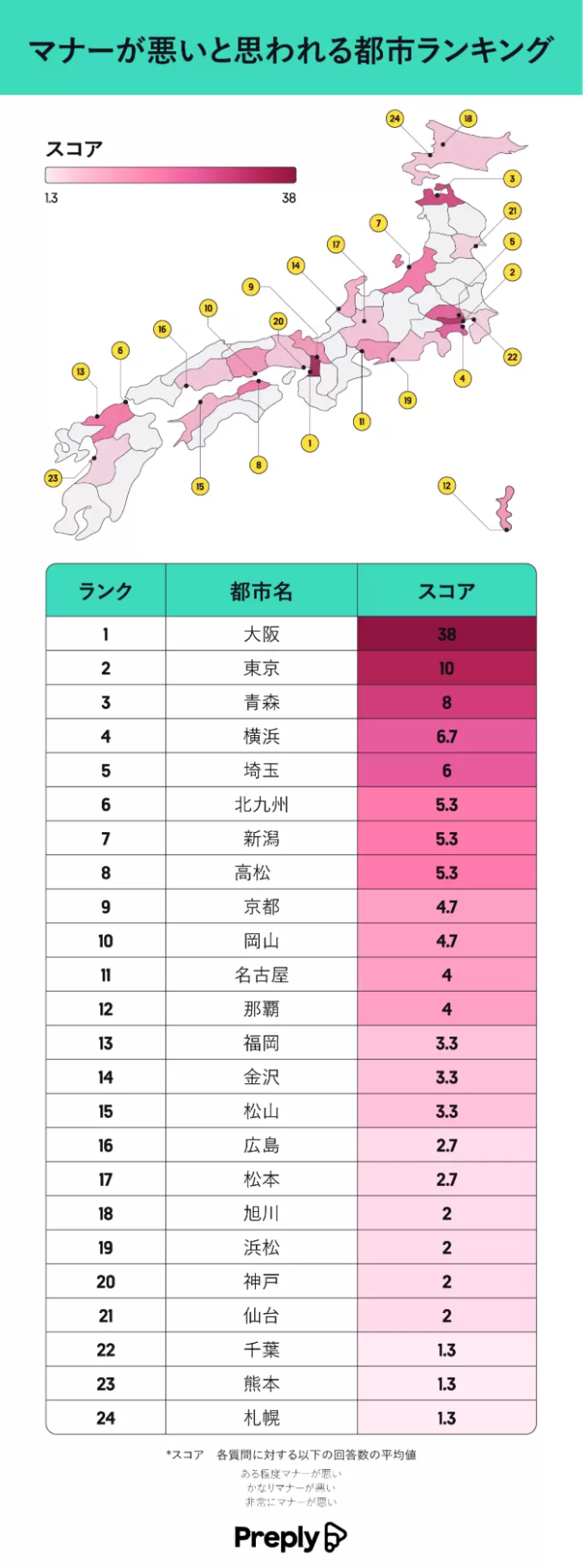
Osaka people are out of touch!? Top 10 cities with the worst manners
So let's take a look at the top 10 cities with the worst manners. Is your city on the list?
Osaka received an overwhelming number of votes as the worst city in the nation, far ahead of the second-placed cities. In second place was Tokyo, in third place was Aomori, in fourth place was Yokohama, and in fifth place was Saitama.
Osaka is a region with a particularly unique culture in Japan, and its rich culture, history, and openness of its people may sometimes be perceived as "bad manners" from the outside.
Looking at the rankings by region, the Kinki region was ranked the worst, followed by the Kanto region in second place and the Chubu region in third place. The rankings are proportional to the population, but it may be said that the manners in the Kinki and Kanto regions are not good nationwide.
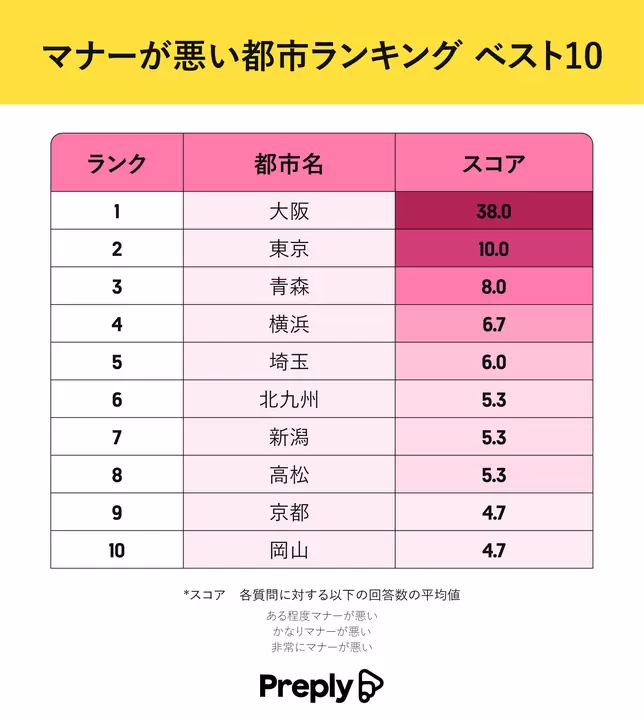
These are the three cities with the most common sense people! Top 10 cities with the best manners
On the other hand, let's take a look at the top 10 places in the country with good manners.
Sapporo, Kumamoto, and Chiba tied for first place, followed by Sendai and Kobe. Of these, Kumamoto is particularly noteworthy, as in a 2023 nationwide survey conducted by the Japan Automobile Federation (JAF) on the "rate of cars stopping when pedestrians cross at crosswalks without traffic lights," Kumamoto Prefecture recorded 66.1%, higher than the national average of 45.1%.
The Road Traffic Act stipulates that pedestrians have priority at crosswalks, etc. as follows.
"When a vehicle, etc., is attempting to pass beside a stopped vehicle at or just before a pedestrian crossing (excluding pedestrians prohibited from crossing at a pedestrian crossing by a traffic signal or a hand signal by a police officer when the vehicle, etc., is passing in front of the stopped vehicle, the vehicle, etc., must stop temporarily before moving in front of the stopped vehicle."
(Quoted from: Law Search, Road Traffic Act, Article 38)
While there are some prefectures where the stopping rate remains in the 20% range, a stopping rate of over 60% can be considered a good score.
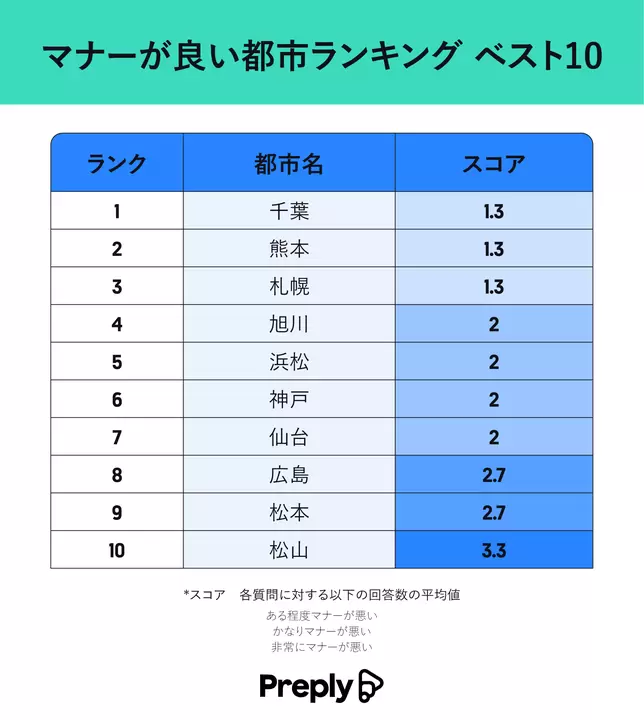
A nuisance that concerns us. Which city has the most rude behavior?
Japan is a culture that values courtesy and good manners towards others, but unfortunately it is also true that there are people who behave in a bad manner in public places and cause a nuisance to others.
Here, we asked survey participants how frequently they had observed 13 types of rude behavior in each city. For each item, the cities in which residents of the corresponding city engaged in that behavior most often were as follows:
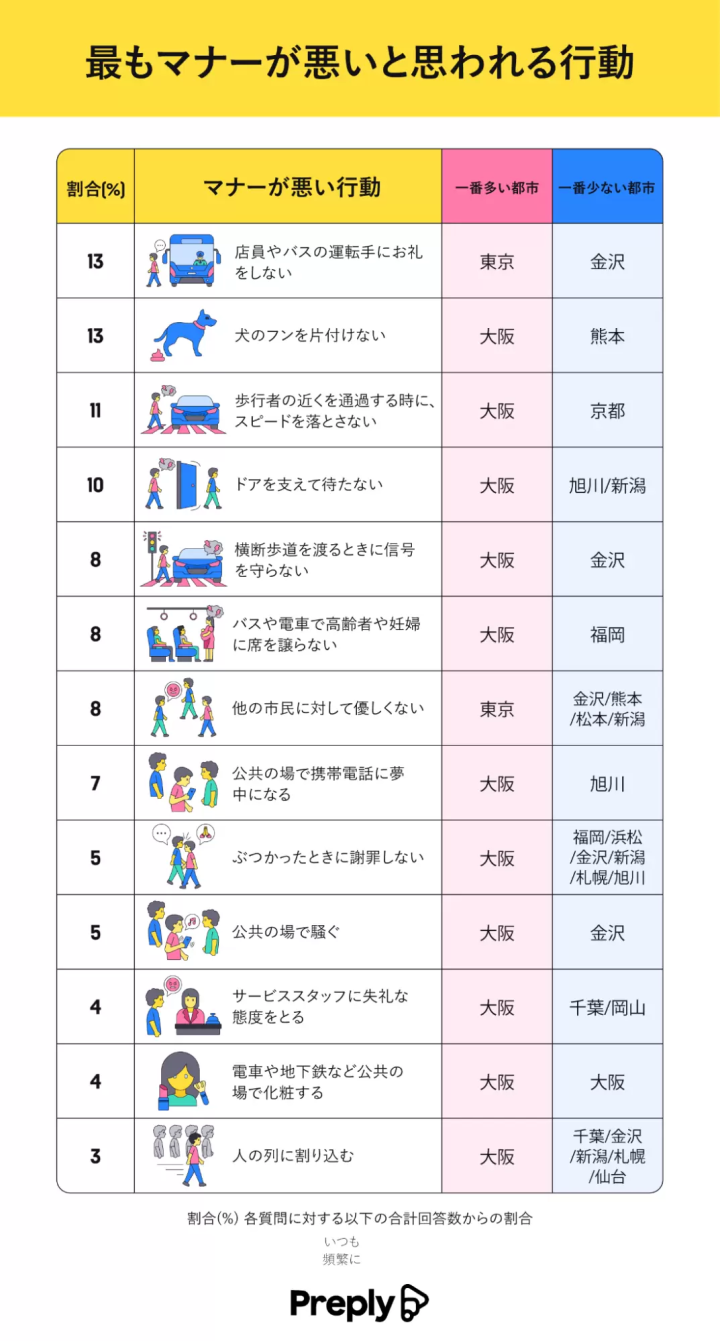
From the above, let's take a look at the top 5 cities where rude behavior was most prevalent.
Osaka and Tokyo, which ranked first and second in the "Top 10 cities with the worst manners" mentioned at the beginning, stand out. Tokyo and Osaka are Japan's three largest cities, and one reason for this may be that they are densely populated. In particular, as many foreign tourists have commented that Osaka is "friendly," the city has a close relationship with people, which may give some people the impression that it is "rude" and "unreserved."
Which city is most rule-abiding?
On the other hand, areas with a high number of responses that rude behavior is "never" or "almost never" can be said to be cities with good manners.
The survey found that Kanazawa, Niigata, Kumamoto, Asahikawa, and Chiba had the fewest instances of rude behavior. Among them, Kanazawa City was listed in almost all categories. In the "2023 Chubu Edition Top 100 Livability Ranking" by Toyo Keizai Inc., Kanazawa City ranked 5th, with four cities in Ishikawa Prefecture, including Nonoichi City, Hakusan City, and Kahoku City, all in the top 10.
This means that it is a city where many people feel comfortable living and where very few people violate etiquette.
Niigata City also scored well in all categories. What Kanazawa City and Niigata City have in common is that most of the cities are relatively small, with populations of less than 100,000, making them compact and making it easier to maintain order.
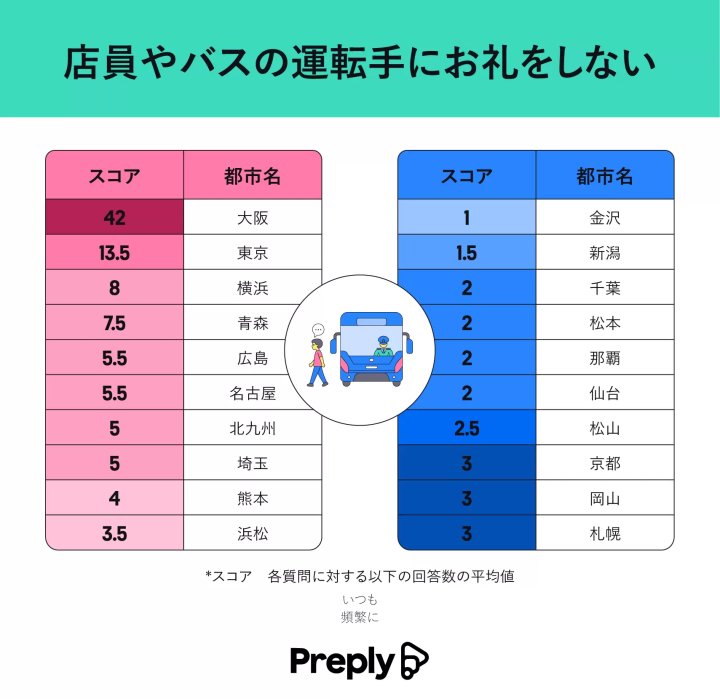
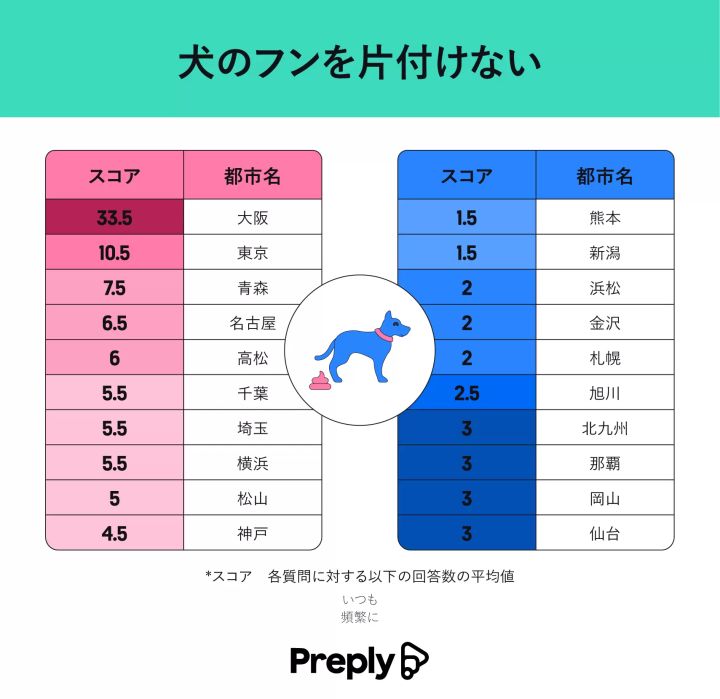
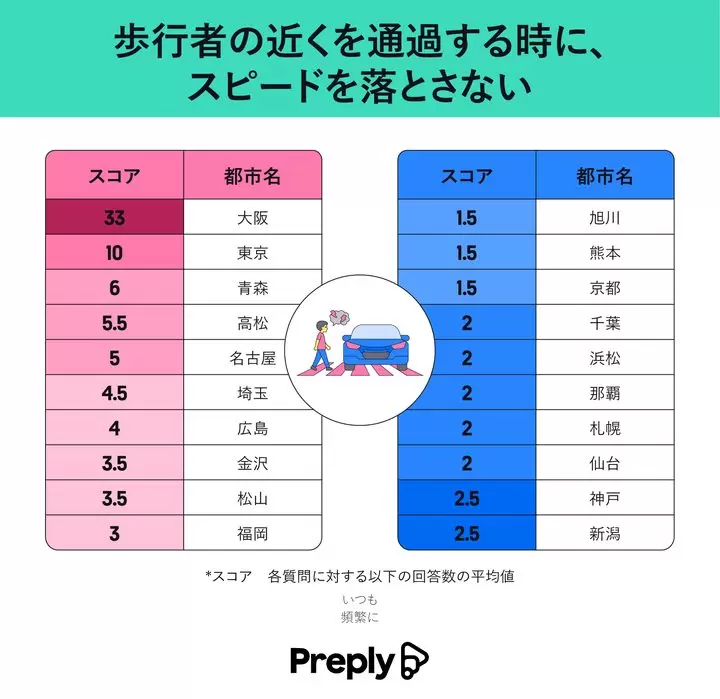
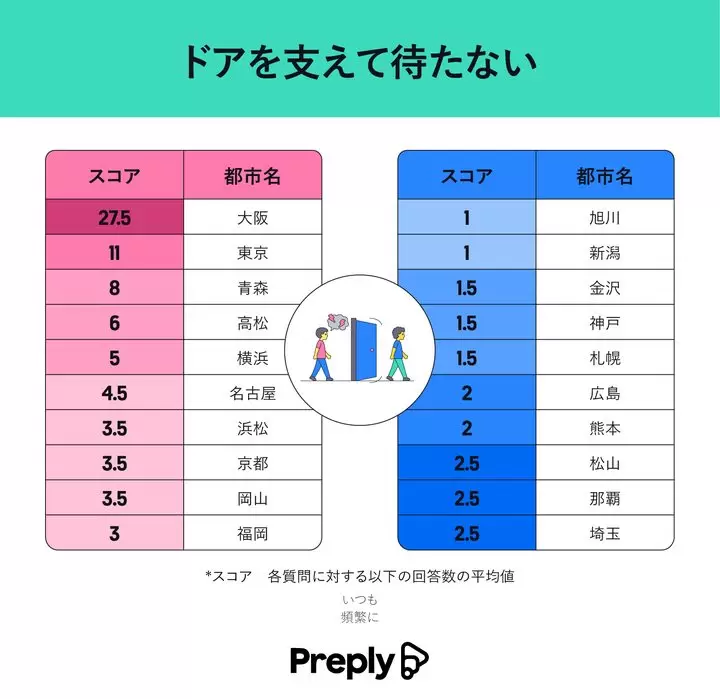
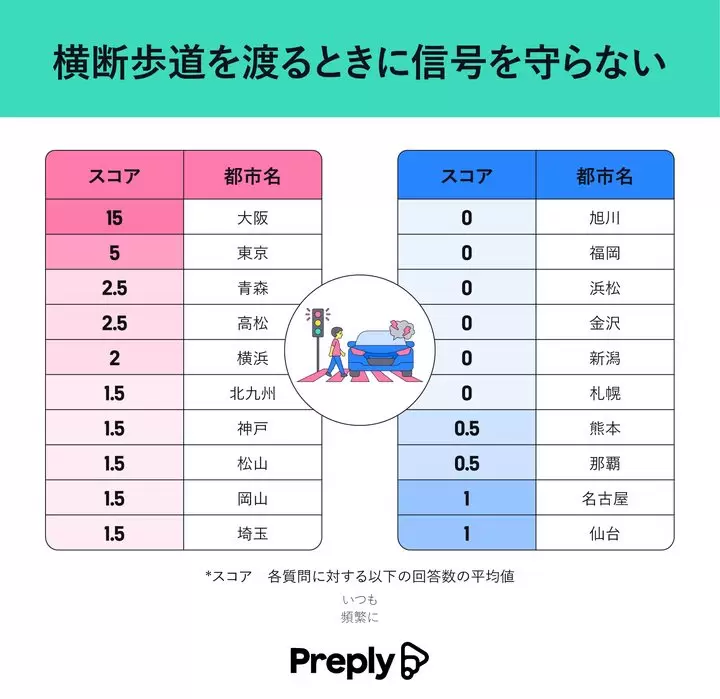
Is using your smartphone while driving disliked? Bad manners in North America
Next, let's turn our focus overseas and look at bad manners in Canada and the United States. Surprisingly, the most common bad manners in North America are related to smartphone etiquette. If you are staying in an English-speaking country, we recommend taking online English conversation lessons with a native speaker beforehand. Not only will this help you improve your English skills, but it will also help you understand cultural differences, such as what actions are considered taboo.
Canada
First, let me introduce a survey (in English) conducted in Canada about the most rude behaviors . The most common behavior that violated manners was "being absorbed in smartphones and acting unruly," followed by "being noisy in public places," and in third place was driving manners, such as "not letting other people merge when there is a traffic jam."
America
Like in Canada, in the US , the most annoying behavior was "being distracted by smartphones and being unruly," followed by "not letting drivers merge in traffic jams" and "not slowing down near pedestrians."
"Smartphone use while walking" is a common behavior that is disliked in both countries. In particular, the United States has strict measures against smartphone use while walking, and in 2012, New Jersey enacted a law banning smartphone use while walking, and violators are fined. In 2017, Hawaii also enacted a law imposing a fine of $15 to $35 on anyone who looks at a smartphone or digital device while crossing the road.
Given this background, it may be that there is a growing awareness of smartphone etiquette among the general public.
Differences between etiquette violations in Japan and overseas
As the saying goes, "What is common sense in Japan is nonsense overseas," the manners that should be observed differ depending on the cultural background. Here, we will introduce some taboos that Japanese people tend to make inadvertently. If you are going abroad for travel or business trips, learning about the manners of that country in advance will also show your respect for the other country.
Sniffle
In Japan, many people feel uncomfortable blowing their nose in public, but in the West, the sound of sniffing is very distasteful. Be especially careful when eating noodles such as ramen or pasta, or when drinking soup or tea.
Calling out loud to a waiter at a restaurant
In Japan, it is not considered rude to call a waiter at a restaurant, but in Western countries, calling a waiter loudly is taboo because it sounds like calling a servant. Each table has a designated waiter, so once you have decided what to order, make eye contact or raise your hand slightly to call the waiter.
Mention physical characteristics
Japan is a mono-ethnic country, with about 98% of the population being Japanese. In Japan, words like "white skin," "skinny," "small face," and "high nose" are considered compliments, but in the United States and Europe, for example, the population is made up of many different ethnicities with many cultural backgrounds, including Westerners, African-Americans, Arabs, and Hispanics. As a result, even if you mean it as a compliment, it may cause the other person to feel inferior or even be taken as an insult. Refrain from talking about physical features.
summary
What did you think? Even if you know you have to follow etiquette, you may unconsciously violate it. Not only in Japan, but also when traveling or studying abroad, be aware of the differences in etiquette in each culture when visiting a new country for the first time.
Preply is a platform where you can easily learn a total of 24 languages online, including Spanish and French , with tutors from over 180 countries. The best way to learn local culture and customs, including manners, is to learn the language through 1:1 private lessons . Since language is deeply rooted in culture, mastering the language will make it easier to communicate with local people. Why not learn about different cultures through language so that you don't accidentally violate etiquette?
source:
- Matsuyama City " Recommendations for U-turn to Matsuyama "
- Toyo Keizai Inc. Livability Ranking 2023 Chubu Edition Top 100
Preply is an online language learning marketplace that connects hundreds of thousands of learners with over 32,000 tutors teaching 50 languages in 180 countries around the world. Machine learning algorithms match students with tutors, who then create customized lesson plans for students based on their budget, schedule, and current knowledge. Founded in 2012 by a Ukrainian team of Kirill Bigai, Serge Lukyanov, and Dmytro Voloshyn, Preply currently has over 400 employees representing 58 nationalities. Based in the United States, Preply has employees in 30 countries across Europe, the United States, Africa, Asia, and Latin America. Address: 1309 Beacon Street, Suite 300, Brookline, MA, 02446
The contents on this page may partially contain automatic translation.
































![[Kagoshima] Enjoy Minamisatsuma City to the Fullest! A Guide to the Scenic Beauty and Culture of Five Areas](https://resources.matcha-jp.com/resize/720x2000/2026/02/15-258755.webp)

![[Yufuin]Yufuin in 100 Minutes: Quick Access Guide](https://resources.matcha-jp.com/resize/720x2000/2026/02/15-258738.webp)
![[Shinjuku Nishiguchi HALC] About the d Point Campaign](https://resources.matcha-jp.com/resize/720x2000/2026/02/14-258714.webp)
